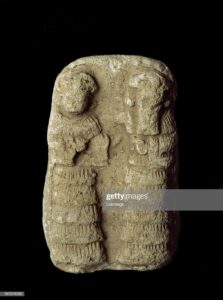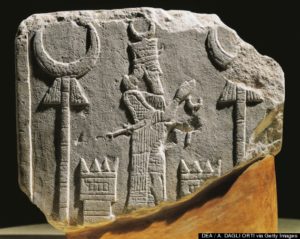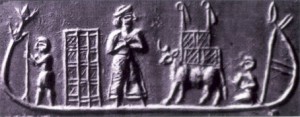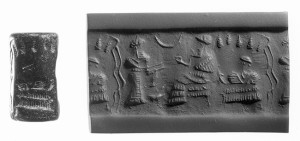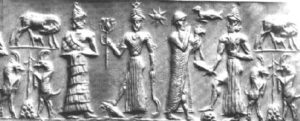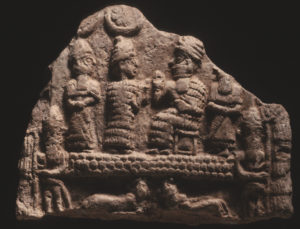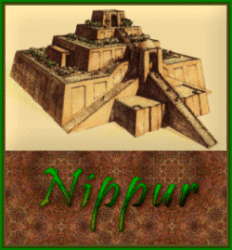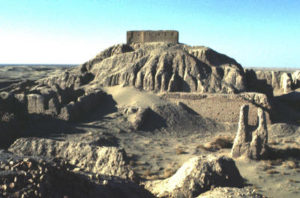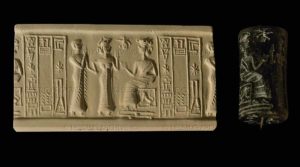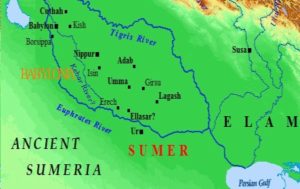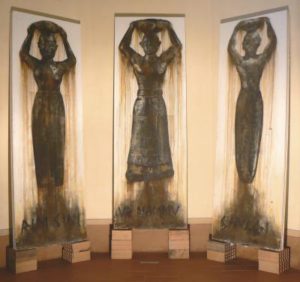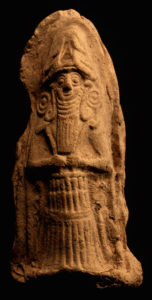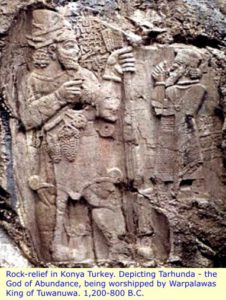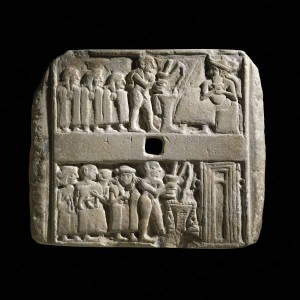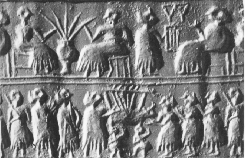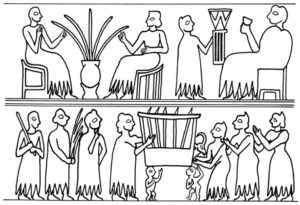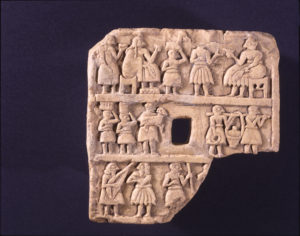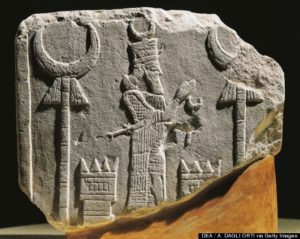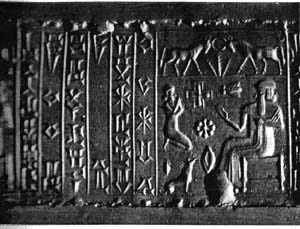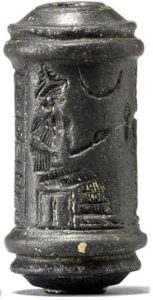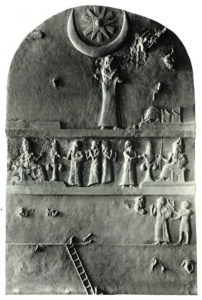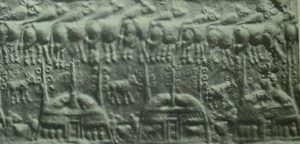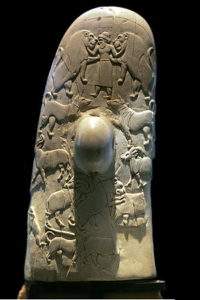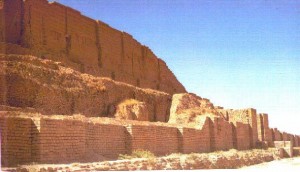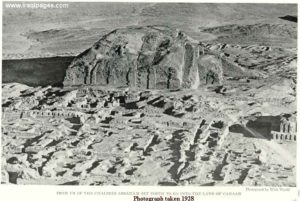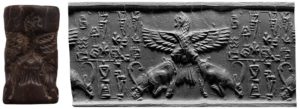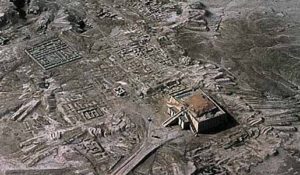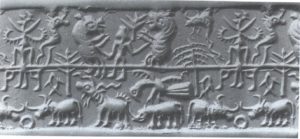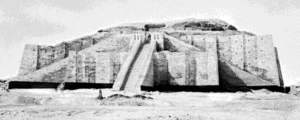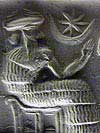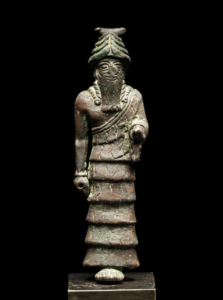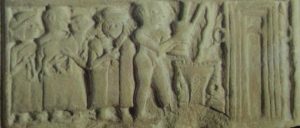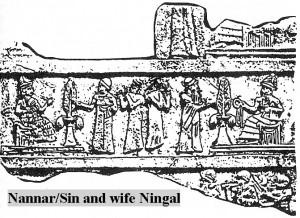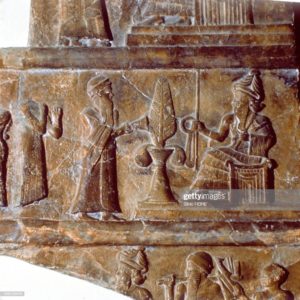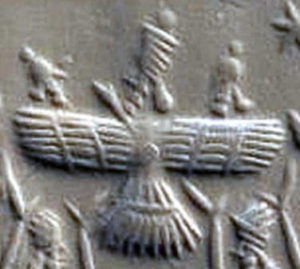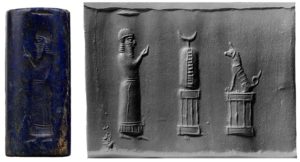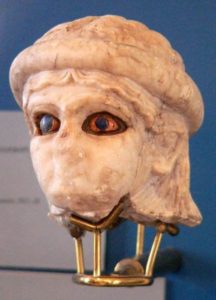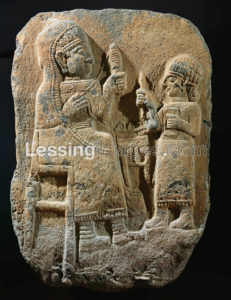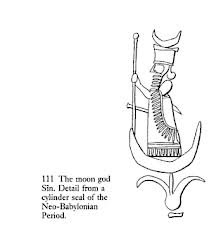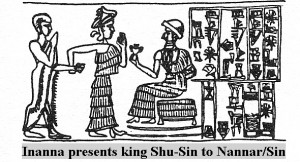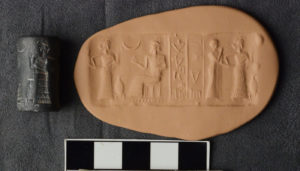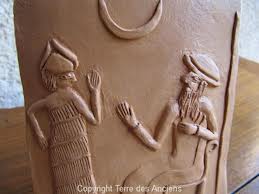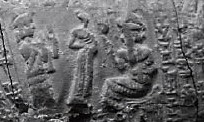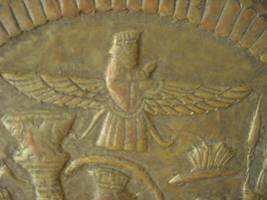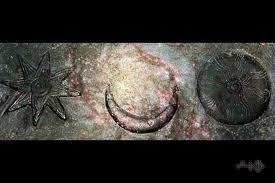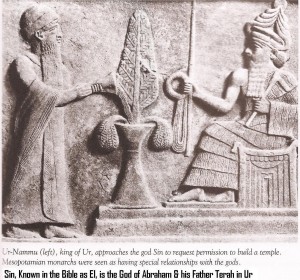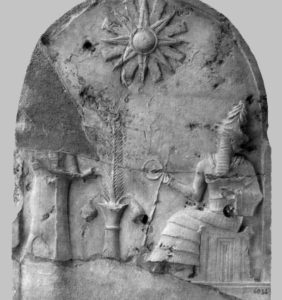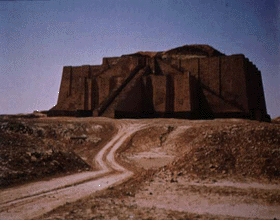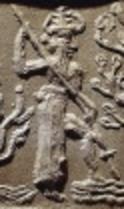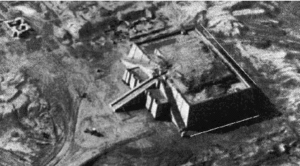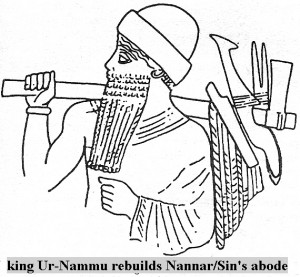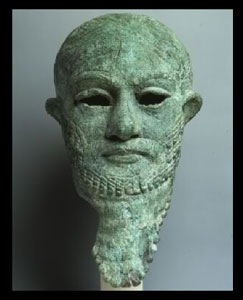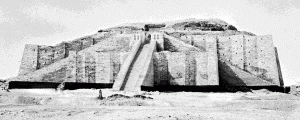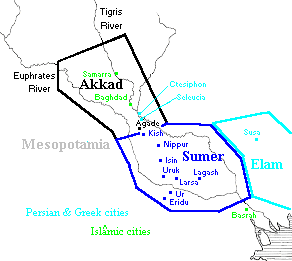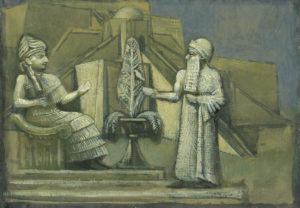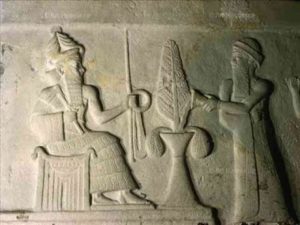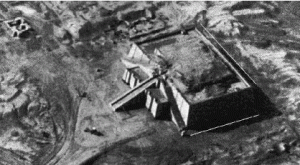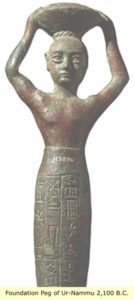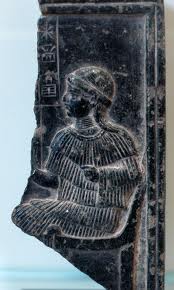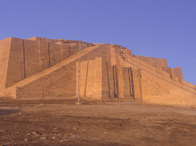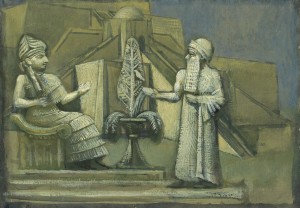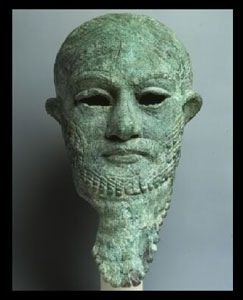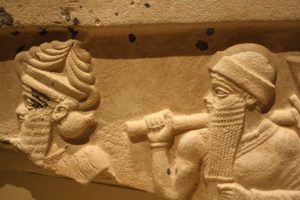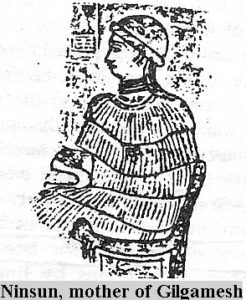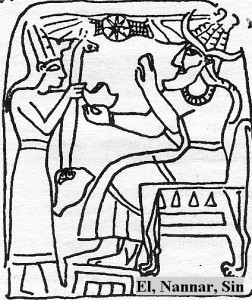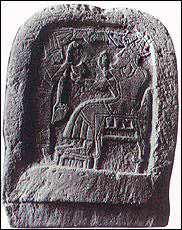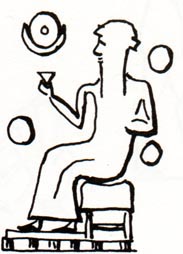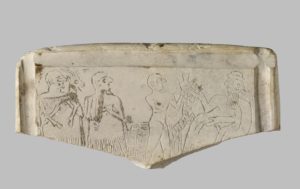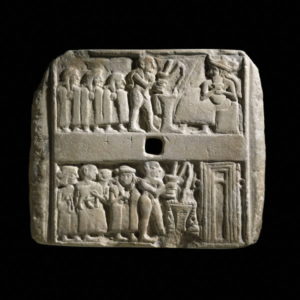(Texts: All Artifacts, Color Coding, & Writings in Bold Type With Italics Inside Parenthesis, are Added by Editor R. Brown, not the Authors, Translators, or Publishers!)
(gods in blue)
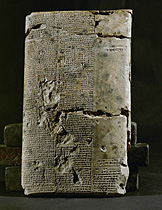 (The Lamentation of Ur Text)
(The Lamentation of Ur Text)
1-8 He has abandoned his cow-pen and has let the breezes (the evil wind, nuclear fall-out) haunt his sheepfold.
The wild bull has abandoned his cow-pen and has let the breezes haunt his sheepfold.
The lord of all the lands has abandoned it and has let the breezes haunt his sheepfold.
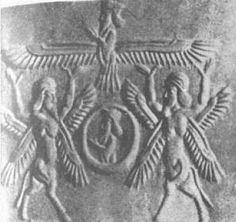 (Anu & son Enlil traverses the skies over Sumer in his sky-disc)
(Anu & son Enlil traverses the skies over Sumer in his sky-disc)
Enlil has abandoned the shrine Nibru and has let the breezes haunt his sheepfold.
His wife Ninlil has abandoned it and has let the breezes haunt her sheepfold.
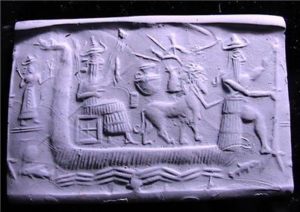 (Ninlil on shore, Enlil, & son Nuska)
(Ninlil on shore, Enlil, & son Nuska)
Ninlil has abandoned that house, the Ki-ur (temple residence), and has let the breezes haunt her sheepfold.
The queen of Kic (Kish patron goddess Ninhursag) has abandoned it and has let the breezes haunt her sheepfold.
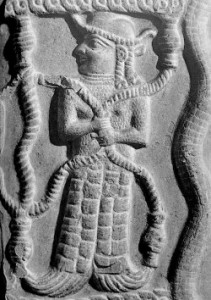 (Ninhursag, eldest daughter to King Anu in Heaven / planet Nibiru. & Chief Medical Scientist)
(Ninhursag, eldest daughter to King Anu in Heaven / planet Nibiru. & Chief Medical Scientist)
Ninmah (Ninhursag) has abandoned that house Kic and has let the breezes haunt her sheepfold.
9-18 She of Isin has abandoned it and has let the breezes haunt her sheepfold.
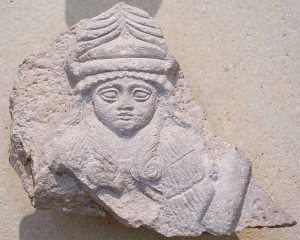 (Bau, daughter on Earth to King Anu in Heaven / planet Nibiru)
(Bau, daughter on Earth to King Anu in Heaven / planet Nibiru)
Ninisina (Bau / Gula) has abandoned the shrine Egal-mah (Bau‘s temple residence in Nippur)
and has let the breezes haunt her sheepfold.
The queen of Unug (Uruk) has abandoned it and has let the breezes haunt her sheepfold.
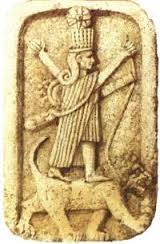 (Inanna, Goddess of Love & War atop her zodiac symbol of Leo, & her 8-Pointed Star symbol)
(Inanna, Goddess of Love & War atop her zodiac symbol of Leo, & her 8-Pointed Star symbol)
Inanna has abandoned that house Unug and has let the breezes haunt her sheepfold.
Nanna (Nannar) has abandoned Urim (Ur) and has let the breezes haunt his sheepfold.
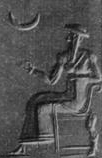 (Nannar, son to Enlil, & father to Inanna, Moon Crescent God of Ur)
(Nannar, son to Enlil, & father to Inanna, Moon Crescent God of Ur)
Suen (Nannar) has abandoned E-kic-nu-jal (ziggurat residence) and has let the breezes haunt his sheepfold.
His wife Ningal has abandoned it and has let the breezes haunt her sheepfold.
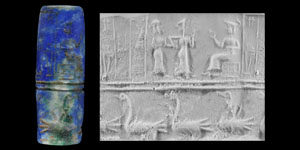 (Inanna presents her spouse-king of Ur to mother Ningal)
(Inanna presents her spouse-king of Ur to mother Ningal)
Ningal has abandoned her Agrun-kug and has let the breezes haunt her sheepfold.
The wild bull of Eridug (Eridu) has abandoned it and has let the breezes haunt his sheepfold.
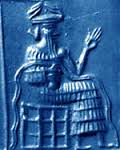
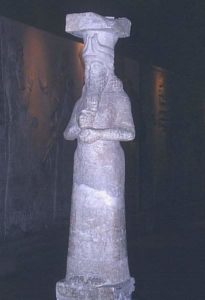 (wisest god Enki, eldest son to King Anu, 1st to arrive on Earth)
(wisest god Enki, eldest son to King Anu, 1st to arrive on Earth)
Enki has abandoned that house Eridug and has let the breezes haunt his sheepfold.
18A-26 (1 ms. adds 1 line: …… (partially preserved name of a goddess)
has abandoned that house Larag and has let the breezes haunt her sheepfold.)
Cara (Shara / Cupid, Inanna & Shu-Suen’s son) has abandoned E-mah and has let the breezes haunt his sheepfold.
Ud-sahara (unidentified?) has abandoned that house Umma and has let the breezes haunt her sheepfold.
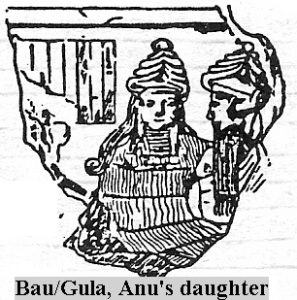 (Bau & spouse Ninurta, daughter on Earth to King Anu)
(Bau & spouse Ninurta, daughter on Earth to King Anu)
Bau (Gula) has abandoned Iri-kug and has let the breezes haunt her sheepfold.
She has abandoned her flooded chamber and has let the breezes haunt her sheepfold.
Her son Ab-Bau has abandoned it and has let the breezes haunt his sheepfold.
Ab-Bau has abandoned Ma-gu-ena and has let the breezes haunt his sheepfold.
The protective goddess of the holy house has abandoned it and has let the breezes haunt her sheepfold.
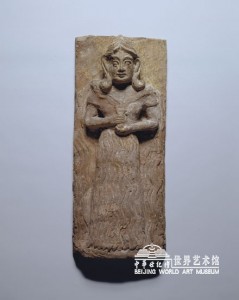 (Ninsun, Ninurta‘s daughter, mother to gods & many semi-divine kings)
(Ninsun, Ninurta‘s daughter, mother to gods & many semi-divine kings)
26-34 The protective goddess has abandoned E-tarsirsir (residence in Lagash) and has let the breezes haunt her sheepfold.
The mother of Lagac (Lagash) has abandoned it and has let the breezes haunt her sheepfold.
Jatumdug (Ninsun) has abandoned that house Lagac and has let the breezes haunt her sheepfold.
She of Nijin (Nanshe, Enki’s daughter) has abandoned it and has let the breezes haunt her sheepfold.
The great queen has abandoned that house Sirara (Lagash district with Nanshe’s temple) and has let the breezes haunt her sheepfold.
She of Kinirca has abandoned it and has let the breezes haunt her sheepfold.
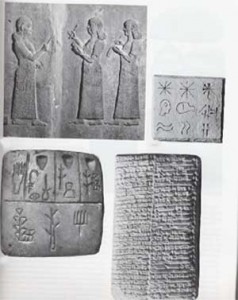 (Geshtinana, goddess daughter to Ninsun & Enki)
(Geshtinana, goddess daughter to Ninsun & Enki)
Dumuzid-abzu (Geshtinanna) has abandoned that house Kinirca and has let the breezes haunt her sheepfold.
She of Gu-aba has abandoned it and has let the breezes haunt her sheepfold.
Ninmarki (Enki‘s daughter) has abandoned the shrine Gu-aba and has let the breezes haunt her sheepfold.
35 1st kirugu.
36-37 She has let the breeze haunt her sheepfold, she groans grievously over it.
O cow, your lowing no longer fills the byre, the cow-pen no longer brings joy (?) to the prince.
38 Its jicgijal.
39-46 O city, the lament is bitter, the lament made for you.
Your lament is bitter, O city, the lament made for you.
In his righteous destroyed city its lament is bitter.
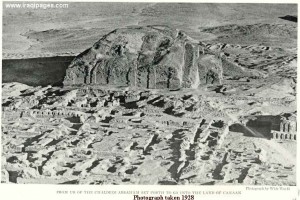 (Nannar‘s ziggurat temple residence in Ur)
(Nannar‘s ziggurat temple residence in Ur)
In his righteous destroyed Urim (Ur), the lament is bitter, the lament made for you.
Your lament is bitter, O city, the lament made for you.
In his destroyed Urim its lament is bitter.
How long will your bitter lament grieve your lord who weeps?
How long will your bitter lament grieve Nanna (Nannar) who weeps?
47-55 O brick-built Urim, the lament is bitter, the lament made for you.
O E-kic-nu-jal, (inner residence of Nannar in Ur) your lament is bitter, the lament made for you.
O shrine (of Ningal’s in Ur) Agrun-kug, the lament is bitter, the lament made for you.
O shrine Ki-ur (Inner residence of Ninlil in Nippur), the lament is bitter, the lament made for you.
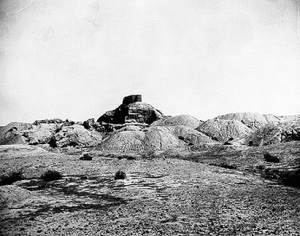 (E-kur, Nippur ziggurat temple residence of Enlil)
(E-kur, Nippur ziggurat temple residence of Enlil)
O shrine Nibru, city, the lament is bitter, the lament made for you.
O brick-built E-kur, the lament is bitter, the lament made for you.
O Ja-jic-cua, the lament is bitter, the lament made for you.
O Ubcu-unkena, the lament is bitter, the lament made for you.
O brick-built Iri-kug, the lament is bitter, the lament made for you.
56-63 O E-tarsirsir (in Lagash), the lament is bitter, the lament made for you.
O Ma-gu-ena, the lament is bitter, the lament made for you.
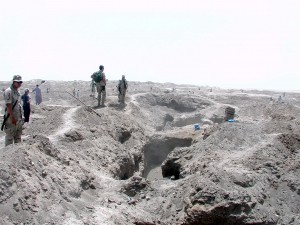 (Bau’s city Isin in ruins)
(Bau’s city Isin in ruins)
O brick-built Isin, the lament is bitter, the lament made for you.
O shrine Egal-mah, the lament is bitter, the lament made for you.
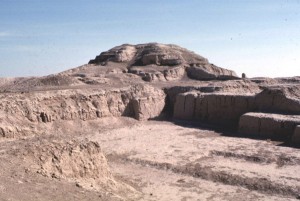 (Inanna‘s city Uruk in ruins)
(Inanna‘s city Uruk in ruins)
O brick-built Unug, the lament is bitter, the lament made for you.
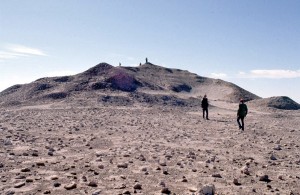 (Enki‘s city Eridu in ruins)
(Enki‘s city Eridu in ruins)
O brick-built Eridug, the lament is bitter, the lament made for you.
How long will your bitter lament grieve your lord who weeps?
How long will your bitter lament grieve Nanna who weeps?
64-71 O city, your name exists but you have been destroyed.
O city, your wall rises high but your Land has perished.
O my city, like an innocent ewe your lamb has been torn from you.
O Urim, like an innocent goat your kid has perished.
O city, your rites have been alienated from you, your powers have been changed into alien powers.
How long will your bitter lament grieve your lord who weeps?
How long will your bitter lament grieve Nanna who weeps?
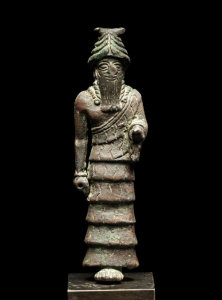 (Nannar, giant alien god of Ur, symbolized by the Moon Crescent)
(Nannar, giant alien god of Ur, symbolized by the Moon Crescent)
72 2nd kirugu.
73-74 In his righteous destroyed city its lament is bitter.
In his destroyed Urim its lament is bitter.
75 Its jicgijal.
76-84 Together with the lord whose house had been devastated, his city was given over to tears.
Together with Nanna whose Land had perished, Urim joined the lament.
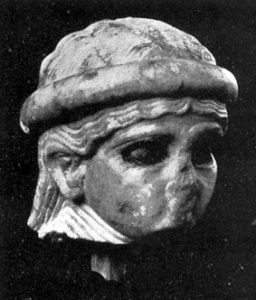
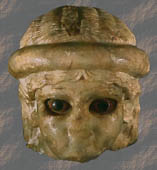 (brown-eyed beauty Ningal, Nannar‘s spouse)
(brown-eyed beauty Ningal, Nannar‘s spouse)
The good woman, to disquiet the lord concerning his city, Ningal, to give him no rest concerning his Land,
approached him for the sake of his city — bitterly she weeps.
She approached the lord for the sake of his house — bitterly she weeps.
She approached him for the sake of his devastated city — bitterly she weeps.
She approached him for the sake of his devastated house — before him she makes its bitter lament.
85-94 The woman, after she had composed her song (?) for the tearful balaj instrument,
herself utters softly a lamentation for the smitten (?) house: (Speaking in the 1st Person)
“The storm that came to be — its lamentation hangs heavy on me.
Raging about because of the storm, I am the woman for whom the storm came to be.
The storm that came to be — its lamentation hangs heavy on me.
The bitter storm having come to be for me during the day,
I trembled on account of that day but I did not flee before the day’s violence.
Because of this wretched storm I could not see a good day for my rule, not one good day for my rule.
95-100A “The bitter lament having come to be for me during the night,
I trembled on account of that night but I did not flee before the night’s violence.
The awesomeness of this storm, destructive of cities, truly hangs heavy on me (catching radiation poisoning by delaying).
Because of its existence, in my nightly sleeping place, even in my nightly sleeping place truly there was no peace for me.
Nor, because of this wretched storm, was the quiet of my sleeping place,
not even the quiet of my sleeping place, allowed to me. (2 mss. add 1 line: Truly I did not forsake my Land.)
101-111 “Because there was bitterness (radiation poisoning) in my Land, I trudged the earth like a cow for its calf.
My Land was not delivered from fear.
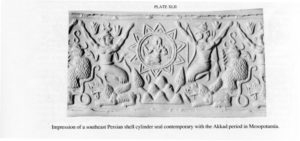 (giant alien goddess in flight, sky-disc over mountains)
(giant alien goddess in flight, sky-disc over mountains)
Because there was bitter distress in my city, I beat my wings like a bird of heaven and flew to my city;
and my city was destroyed in its foundations; and Urim perished where it lay (nuclear devastation).
Because the hand of the storm appeared above (missiles), I screamed and cried to it “Return, O storm, to the plain”.
The storm’s breast did not rise.
112-122 “To me, the woman, in the Agrun-kug, my house of queenship, they did not grant a reign of distant days.
Indeed they established weeping and lamentation for me.
As for the house which used to be where the spirit of the black-headed people (earthlings) was soothed,
instead of its festivals wrath and terror indeed multiply.
Because of this wretched storm, heavy spirit, and lament and bitterness,
lament and bitterness have been brought into my house, the favorable place,
my devastated righteous house upon which no eye had been cast.
My house founded by the righteous was pushed over on its side like a garden fence.
123-132 “For E-kic-nu-jal, my house of royalty, the good house, my house which has been given over to tears,
they granted to me as its lot and share: its building, falsely, and its perishing, truly.
Wind and rain have been made to fall on it, as onto a tent,
a shelter on the denuded harvest ground, as onto a shelter on the denuded harvest ground.
Urim, my all-surpassing chamber, the house and the smitten city, all have been uprooted.
Like a shepherd’s sheepfold it has been uprooted.
The swamp has swallowed my possessions accumulated in the city.”
133 3rd kirugu.
134 Urim has been given over to tears.
135 Its jicgijal.
136-143 “On that day, when such a storm had pounded, when in the presence of the queen her city had been destroyed,
on that day, when such a storm had been created, when they had pronounced the utter destruction of my city,
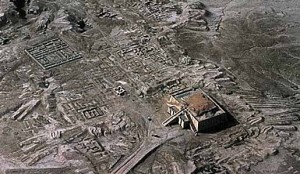 (ruins Nannar‘s & Ningal’s house in Ur)
(ruins Nannar‘s & Ningal’s house in Ur)
when they had pronounced the utter destruction of Urim, when they had directed that its people be killed,
on that day I did not abandon my city, I did not forsake my land (Nannar & NIngal fell ill, & faded into retirement).
144-150 “Truly I shed my tears before An (Anu).
Truly I myself made supplication to Enlil.
“Let not my city be destroyed,” I implored them.
“Let not Urim be destroyed,” I implored them.
“Let not its people perish,” I implored them.
But An did not change that word.
Enlil did not soothe my heart with an “It is good — so be it”.
151-160 “A second time, when the council had settled itself in the pre-eminent place,
and the Anuna (Anunnaki) had seated themselves to ratify decisions,
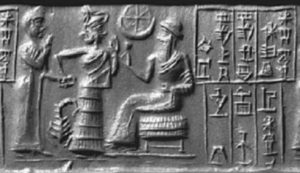 (semi-divine king, Inanna, & Nannar, Moon Crescent God of Ur)
(semi-divine king, Inanna, & Nannar, Moon Crescent God of Ur)
I (Nannar / Sin) prostrated (?) myself and stretched out my arms.
Truly I shed my tears before An.
Truly I myself made supplication to Enlil.
“Let not my city be destroyed,” I implored them.
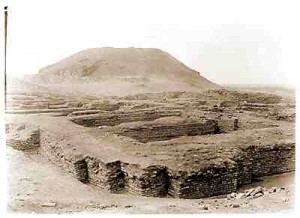 (mud brick ruins of Ur, Nannar‘s home)
(mud brick ruins of Ur, Nannar‘s home)
“Let not Urim be destroyed,” I implored them.
“Let not its people perish,” I implored them.
But An did not change that word.
Enlil did not soothe my heart with an “It is good — so be it”.
161-168 “They gave instructions that my city should be utterly destroyed.
They gave instructions that Urim should be utterly destroyed.
They decreed its destiny that its people should be killed.
In return for the speech (?) which I had given them, they both bound me together with my city
and also bound my Urim together with me.
An is not one to change his command, and Enlil does not alter what he has uttered.”
169 4th kirugu.
170 Her city has been destroyed in her presence, her powers have been alienated from her.
171 Its jicgijal.
172-178 Enlil called the storm — the people groan.
He brought the storm of abundance away from the Land — the people groan.
He brought the good storm away from Sumer — the people groan.
He issued directions to the evil storm — the people groan.
He entrusted it to Kij-gal-uda (Adad), the keeper of the storm.
He called upon the storm that annihilates the Land — the people groan.
He called upon the evil gales — the people groan.
179-187 Enlil brought Gibil (Enki’s son) as his aid.
He called the great storm of heaven — the people groan.
The great storm howls above — the people groan.
The storm that annihilates the Land roars below — the people groan.
The evil wind, like a rushing torrent, cannot be restrained.
It attacks the weapons of the city and completely devours them.
At the horizon it …… — the people groan.
In front of the storm, heat blazes — the people groan.
The midday heat burns with the furiously battling storm.
188-191 After the haze had lifted at noon, he made fires blaze.
He locked up the day and the rising of the bright sun together with the good storm.
In the Land he did not let the bright sun rise; it shone like the evening star (planet Venus).
In the delightful night, the time when coolness sets in, he redoubled the south wind (another missile).
192-196 The scorching potsherds made the dust glow (?) — the people groan.
He swept the winds over the black-headed people — the people groan.
Sumer was overturned by a snare — the people groan.
It attacked (?) the Land and devoured it completely (nuclear fall-out).
Tears cannot influence the bitter storm — the people groan.
197-203 The reaping storm dragged across the Land.
Like a flood storm it completely destroyed the city.
The storm that annihilates the Land set up its powers in the city.
The storm that will make anything vanish came doing evil.
The storm blazing like fire performed its task upon the people.
The storm ordered by Enlil in hate, the storm which wears away the Land,
covered Urim like a garment, was spread out over it like linen.
204 5th kirugu.
205 The storm, like a lion, has attacked unceasingly — the people groan.
206 Its jicgijal.
207-217 Then the storm was removed from the city, that city reduced to ruin mounds.
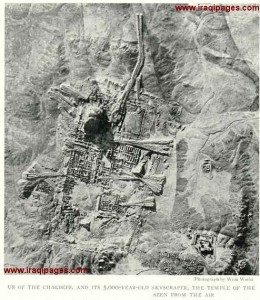 (Ur ruins from above)
(Ur ruins from above)
It was removed from Father Nanna‘s city reduced to ruin mounds — the people groan.
Then, the storm was taken from the Land — the people groan.
(2 mss. add 1 line: The good storm was taken from Sumer — the people groan.)
Its people littered its outskirts just as if they might have been broken potsherds.
Breaches had been made in its walls — the people groan.
On its lofty city-gates where walks had been taken, corpses were piled.
On its boulevards where festivals had been held, heads lay scattered (?).
In all its streets where walks had been taken, corpses were piled.
In its places where the dances of the Land had taken place, people were stacked in heaps.
They made the blood of the Land flow down the wadis like copper or tin.
Its corpses, like fat left in the sun, melted away of themselves.
218-229 The heads of its men slain by the ax were not covered with a cloth.
Like a gazelle caught in a trap, their mouths bit the dust.
Men struck down by the spear were not bound with bandages.
As if in the place where their mothers had labored, they lay in their own blood.
Its men who were finished off by the battle-mace were not bandaged with new (?) cloth.
Although they were not drunk with strong drink, their necks drooped on their shoulders.
He who stood up to the weapon was crushed by the weapon — the people groan.
He who ran away from it was overwhelmed (?) by the storm — the people groan.
The weak and the strong of Urim perished from hunger.
Mothers and fathers who did not leave their houses were consumed by fire.
The little ones lying in their mothers’ arms were carried off like fish by the waters.
Among the nursemaids with their strong embrace, the embrace was pried open.
230-240 The Land’s judgment disappeared — the people groan.
The Land’s counsel was swallowed by a swamp — the people groan.
The mother absconded before her child’s eyes — the people groan.
The father turned away from his child — the people groan.
In the city the wife was abandoned, the child was abandoned, possessions were scattered about.
The black-headed people were carried off from their strongholds.
Its queen like a bird in fright departed from her city.
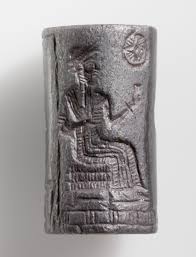 (Ningal, patron goddess of Ur)
(Ningal, patron goddess of Ur)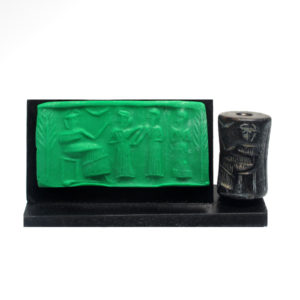
Ningal like a bird in fright departed from her city.
All the treasures accumulated in the Land were defiled.
In all the storehouses abounding in the Land fires were kindled.
In its ponds Gibil, the purifier, relentlessly did his work.
241-249 The good house of the lofty untouchable mountain, E-kic-nu-jal, was entirely devoured by large axes.
The people of Cimacki and Elam, the destroyers, counted its worth as only thirty shekels.
They broke up the good house with pickaxes.
They reduced the city to ruin mounds.
Its queen cried, “Alas, my city”, cried, “Alas, my house”.
Ningal cried, “Alas, my city,” cried, “Alas, my house.
As for me, the woman, both my city has been destroyed and my house has been destroyed.
O Nanna (Nannar), the shrine Urim has been destroyed and its people have been killed.”
250 6th kirugu.
251-252 In her cow-pen, in her sheepfold the woman utters bitter words: “The city has been destroyed by the storm.”
253 Its jicgijal.
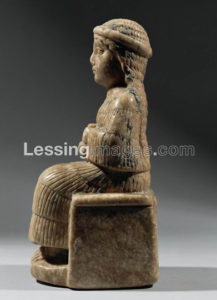 (Ningal, spouse to Nannar, Queen Goddess of Ur)
(Ningal, spouse to Nannar, Queen Goddess of Ur)
254-264 Mother Ningal, like an enemy, stands outside her city.
The woman laments bitterly over her devastated house.
Over her devastated shrine Urim, the princess bitterly declares:
“An has indeed cursed my city, my city has been destroyed before me.
Enlil has indeed transformed my house, it has been smitten by pickaxes.
On my ones coming from the south he hurled fire (exploding missiles).
Alas, my city has indeed been destroyed before me.
On my ones coming from the highlands Enlil hurled flames (more missiles).
Outside the city, the outer city was destroyed before me — I shall cry “Alas, my city”.
Inside the city, the inner city was destroyed before me — I shall cry “Alas, my city”.
My houses of the outer city were destroyed — I shall cry “Alas, my houses”.
My houses of the inner city were destroyed — I shall cry “Alas, my houses”.
265-274 “My city no longer multiplies for me like good ewes, its good shepherd is gone.
Urim no longer multiplies for me like good ewes, its shepherd boy is gone.
My bull no longer crouches in its cow-pen, its herdsman is gone.
My sheep no longer crouch in their fold, their herdsman is gone.
In the river of my city dust has gathered, and the holes of foxes have been dug there.
In its midst no flowing water is carried, its tax-collector is gone.
In the fields of my city there is no grain, their farmer is gone.
My fields, like fields from which the hoe has been kept away (?), have grown tangled (?) weeds.
My orchards and gardens that produced abundant syrup and wine have grown mountain thornbushes.
My plain that used to be covered in its luxurious verdure has become cracked (?) like a kiln.
275-285 “My possessions, like a flock of rooks rising up, have risen in flight — I shall cry “O my possessions”.
He who came (primitive attackers) from the south has carried my possessions off to the south — I shall cry “O my possessions”.
He who came (primitive attackers) from the highlands has carried my possessions off to the highlands — I shall cry “O my possessions”.
My silver, gems and lapis lazuli have been scattered about — I shall cry “O my possessions”.
The swamp has swallowed my treasures — I shall cry “O my possessions”.
Men ignorant of silver have filled their hands with my silver.
Men ignorant of gems have fastened my gems around their necks.
My small birds and fowl have flown away — I shall say “Alas, my city”.
My slave-girls and children have been carried off by boat — I shall say “Alas, my city”.
Woe is me, my slave-girls bear strange emblems in a strange city.
My young men mourn in a desert they do not know.
286-291 “Woe is me, my city which no longer exists — I am not its queen.
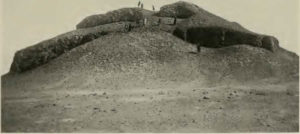 (Nannar’s & Ningal’s Ur in ruins)
(Nannar’s & Ningal’s Ur in ruins)
Nanna, Urim which no longer exists — I am not its owner.
I am the good woman whose house has been made into ruins,
whose city has been destroyed, in place of whose city a strange city has been built.
I am Ningal whose city has been made into ruins, whose house has been destroyed,
in place of whose house a strange house has been built.
292-298 “Woe is me, the city has been destroyed, my house too has been destroyed.
Nanna, the shrine Urim has been destroyed, its people killed.
Woe is me, where can I sit, where can I stand?
Woe is me, in place of my city a strange house is being erected.
I am the good woman in place of whose house a strange city is being built.
Upon its removal from its place, from the plain,
I shall say “Alas, my people”. Upon my city’s removal from Urim, I shall say “Alas, my house”.”
299-309 The woman tears at her hair as if it were rushes.
She beats the holy ub drum at her chest, she cries “Alas, my city”.
Her eyes well with tears, she weeps bitterly: “Woe is me, my city which no longer exists — I am not its queen.
Nanna, the shrine Urim which no longer exists — I am not its owner.
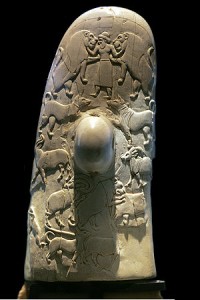 (Nannar protecting his cattle pens in Ur)
(Nannar protecting his cattle pens in Ur)
Woe is me, I am one whose cow-pen has been torn down, I am one whose cows have been scattered.
I am Ningal on whose ewes the weapon has fallen, as in the case of an unworthy herdsman.
Woe is me, I have been exiled from the city, I can find no rest. I am Ningal,
I have been exiled from the house, I can find no dwelling place.
I am sitting as if a stranger with head high in a strange city.
Debt-slaves …… bitterness …….
310-320 “I am one who, sitting in a debtors prison among its inmates, can make no extravagant claims.
In that place I approached him for the sake of his city — I weep bitterly.
I approached the lord for the sake of his house — I weep bitterly.
I approached him for the sake of his destroyed house — I weep bitterly.
I approached him for the sake of his destroyed city — I weep bitterly.
Woe is me, I shall say “Fate of my city, bitter is the fate of my city”.
I the queen shall say “O my destroyed house, bitter is the fate of my house”.
O my brick-built Urim which has been flooded, which has been washed away,
O my good house, my city which has been reduced to ruin mounds,
in the debris of your destroyed righteous house, I shall lie down alongside you.
Like a fallen bull, I will never rise up from your wall (?).
321-327 “Woe is me, untrustworthy was your building, and bitter your destruction.
I am the woman at whose shrine Urim the food offerings have been terminated.
O my Agrun-kug, the all-new house whose charms never sated me,
O my city no longer regarded as having been built — devastated for what reason?
O my house both destroyed and devastated — devastated for what reason?
Nobody at all escaped the force of the storm ordered in hate.
O my house of Suen in Urim, bitter was its destruction.”
328 7th kirugu.
329 “Alas, my city, alas, my house.”
330 Its jicgijal.
331-341 O queen, how is your heart ……!
How you have become!

(Ningal, Ur King Ur-Nammu, damaged Ninsun, again, & Nannar)
O Ningal, how is your heart ……!
How you have become!
O good woman whose city has been destroyed, now how do you exist?
O Ningal whose Land has perished, how is your heart ……!
After your city has been destroyed, now how do you exist?
After your house has been destroyed, how is your heart ……!
Your city has become a strange city, now how do you exist?
Your house has turned to tears, how is your heart ……!
You are not a bird of your city which has been reduced to ruin mounds.
You cannot live there as a resident in your good house given over to the pickaxe.
You cannot act as queen of a people led off to slaughter.
342-347 Your tears have become strange tears, your Land no longer weeps.
With no lamentation prayers, it dwells in foreign lands.
Your Land like …….
Your city has been made into ruins; now how do you exist?
Your house has been laid bare, how is your heart ……!
Urim, the shrine, is haunted by the breezes, now how do you exist?
348-358 Its gudu priest no longer walks in his wig, how is your heart ……!
Its en priest no longer lives in the jipar, now how do you exist?
The uzga priest who cherishes purification rites makes no purification rites for you.
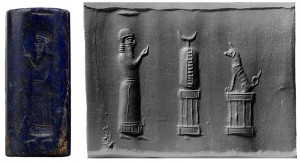 (Nannar in his Ur temple residence E-kishnugal)
(Nannar in his Ur temple residence E-kishnugal)
Father Nanna, your icib priest does not make perfect holy supplications to you.
Your lumah priest does not dress in linen in your holy giguna shrine.
Your righteous en priest chosen in your ardent heart,
he of the E-kic-nu-jal, does not proceed joyously from the shrine to the jipar.
The aua priests do not celebrate the festivals in your house of festivals.
They do not play for you the cem and ala instruments which gladden the heart, nor the tigi.
The black-headed (earthlings) people do not bathe during your festivals.
Like …… mourning has been decreed for them; their appearance has indeed changed.
359-368 Your song has been turned into weeping before you — how long will this last?
Your tigi music has been turned into lamentation before you — how long will this last?
Your bull is not brought into its pen, its fat is not prepared for you.
Your sheep does not live in its fold, its milk is not made abundant for you.
Your fat carrier does not come to you from the cow-pen — how long will this last?
Your milk carrier does not come to you from the sheepfold — how long will this last?
An evildoer has seized your fisherman who was carrying fish — how long will this last?
Lightning carried off your fowler who was carrying birds — how long will this last?
The teme plants grow in the middle of your watercourses which were once suitable for barges,
and mountain thornbushes grow on your roads which had been constructed for wagons.
369-377 My queen, your city weeps before you as its mother. Urim, like a child lost in a street, seeks a place before you.
Your house, like a man who has lost everything, stretches out (?) its hands to you.
Your brick-built righteous house, like a human being, cries “Where are you?”.
My queen, you have indeed left the house, you have left the city.
How long will you stand aside from your city like an enemy?
Mother Ningal, you confronted your city like an enemy.
Although you are a queen who loves her city, you abandoned your sheepfold.
Although you are one who cares for her Land, you set it on fire.
378-386 Mother Ningal, return like a bull to your cattle-pen, like a sheep to your fold,
like a bull to your cattle-pen of former days, like a sheep to your fold.
My queen, like a young child to your room, return to your house.
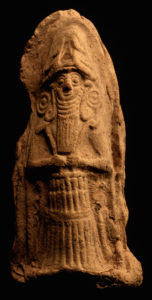 (Anu, King of the alien Anunnaki gods on Earth Colony & in Heaven / planet Nibiru)
(Anu, King of the alien Anunnaki gods on Earth Colony & in Heaven / planet Nibiru)
May An, king of the gods, declare “Enough!” to you.
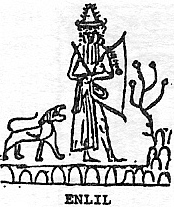 (Enlil, son & heir to King Anu, appointed as Earth Colony Commander)
(Enlil, son & heir to King Anu, appointed as Earth Colony Commander)
May Enlil, king of all the lands, decree your fate.
May he restore your city for you — exercise its queenship!
May he restore Nibru for you — exercise its queenship!
May he restore Urim for you — exercise its queenship!
May he restore Isin for you — exercise its queenship!
387 8th kirugu.
388 “My powers have been alienated from me.”
389 Its jicgijal.
390-398 Alas, storm after storm swept the Land together: the great storm of heaven, the ever-roaring storm,
the malicious storm which swept over the Land, the storm which destroyed cities, the storm which destroyed houses,
the storm which destroyed cow-pens, the storm which burned sheepfolds, which laid hands on the holy rites,
which defiled the weighty counsel, the storm which cut off all that is good from the Land,
the storm which pinioned the arms of the black-headed people.
399 9th kirugu.
400 The storm which does not respect …….
401 Its jicgijal.
402-410 The storm which knows no mother, the storm which knows no father, the storm which knows no wife,
the storm which knows no child, the storm which knows no sister,
the storm which knows no brother, the storm which knows no neighbor,
the storm which knows no female companion, the storm which caused the wife to be abandoned,
which caused the child to be abandoned, the storm which caused the light in the Land to disappear,
the storm which swept through, ordered in hate by Enlil—
father Nanna, may that storm swoop down no more on your city.
May your black-headed people see it no more.
411-416 May that storm, like rain pouring down from heaven, never recur.
May that storm, which struck down all the black-headed living beings of heaven and earth, be entirely destroyed.
May the door be closed on it, like the great city-gate at night-time.
May that storm not be given a place in the reckoning, may its record be hung from a nail outside the house of Enlil.
417 10th kirugu.
418 Until distant days, other days, future days.
419 Its jicgijal.
420-426 From distant days when the Land was founded, O Nanna, the humble people who lay hold of your feet
have brought to you their tears for the smitten house, playing music before you.
May the black-headed people, cast away from you, make obeisance to you.
In your city reduced to ruin mounds may a lament be made to you.
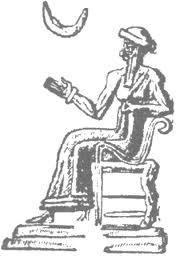 (Nannar, Moon Crescent God of Ur)
(Nannar, Moon Crescent God of Ur)
O Nanna, may your restored city be resplendent before you.
Like a bright heavenly star may it not be destroyed, may it pass before you.
427-437 The personal deity of a man brings you a greeting gift; a supplicant utters prayers to you.
Nanna, you who have mercy on the Land, Lord Acimbabbar (Nannar) —
as concerns him who speaks your heart’s desire, Nanna, after you have absolved that man’s sin,
may your heart relent towards him who utters prayers to you.
(3 mss. add 1 line: The personal deity of this man brings you a present.)
He looks favorably on the man who stands there with his offering.
Nanna, you whose penetrating gaze searches hearts, may its people who suffered that evil storm be pure before you.
May the hearts of your people who dwell in the Land be pure before you.
Nanna, in your restored city may you be fittingly praised.
438 11th kirugu.
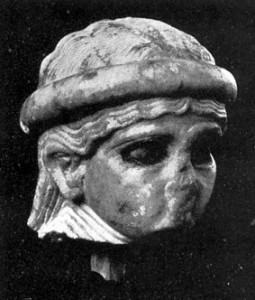 (Ningal, Nannar‘s spouse, Goddess of Ur, earthlings in her image & likeness)
(Ningal, Nannar‘s spouse, Goddess of Ur, earthlings in her image & likeness)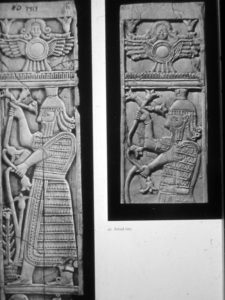 (winged goddess in her sky-disc hovering above her semi-divine kings)
(winged goddess in her sky-disc hovering above her semi-divine kings)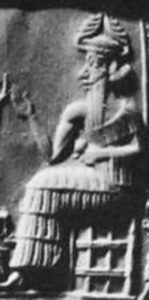 (Enlil called for his children to nuke Enki‘s son Marduk & grandsons)
(Enlil called for his children to nuke Enki‘s son Marduk & grandsons) 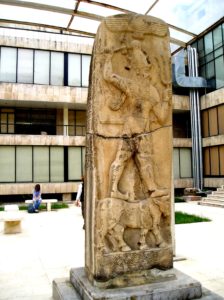 (Storm God Adad, artifact of Aleppo, this, & so many others are now destroyed by Radical Islam)
(Storm God Adad, artifact of Aleppo, this, & so many others are now destroyed by Radical Islam)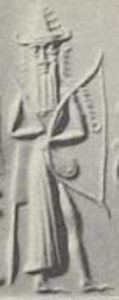
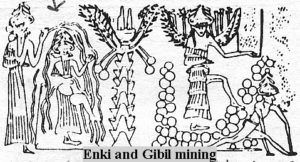 (Enlil, Earth Colony Commander, Gibil, God of the Kilns, metals)
(Enlil, Earth Colony Commander, Gibil, God of the Kilns, metals) (Nannar, Enlil‘s son, Moon Crescent patron god of Ur, the god of Biblical Abraham)
(Nannar, Enlil‘s son, Moon Crescent patron god of Ur, the god of Biblical Abraham) (Ningal, King Ur-Nammu twice, & Nannar) (Nannar, god of the Moon and spouse of Ningal)
(Ningal, King Ur-Nammu twice, & Nannar) (Nannar, god of the Moon and spouse of Ningal)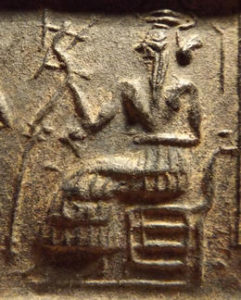 (Enlil, King Anu‘s son & heir to planet Nibiru‘s throne, & their Earth Colony)
(Enlil, King Anu‘s son & heir to planet Nibiru‘s throne, & their Earth Colony)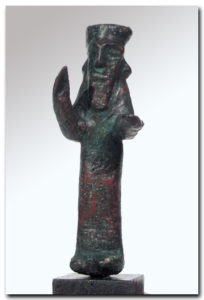
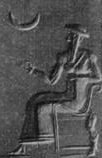 (Enlil & son Nannar, giant alien Anunnaki gods stationed on Earth)
(Enlil & son Nannar, giant alien Anunnaki gods stationed on Earth)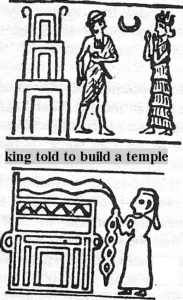 (top: semi-divine king & mother goddess Ninsun, bottom: high-priestess decorates Nannar‘s ziggurat)
(top: semi-divine king & mother goddess Ninsun, bottom: high-priestess decorates Nannar‘s ziggurat)

































